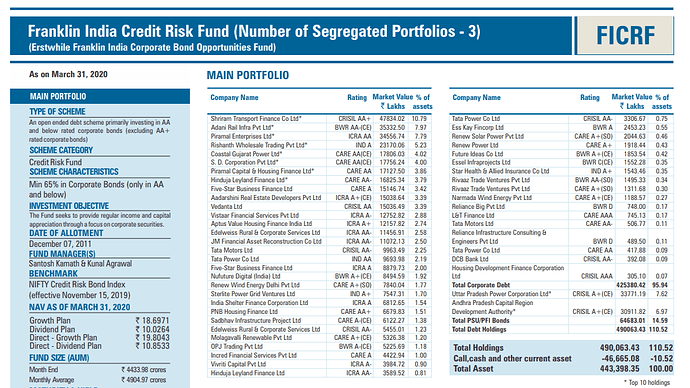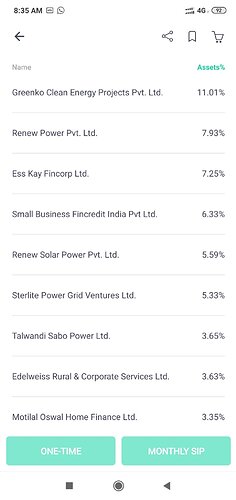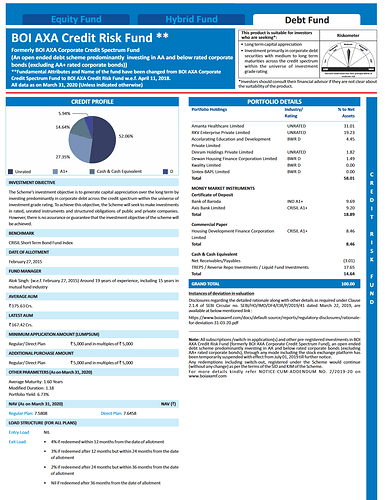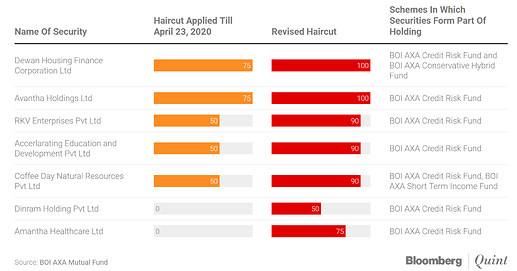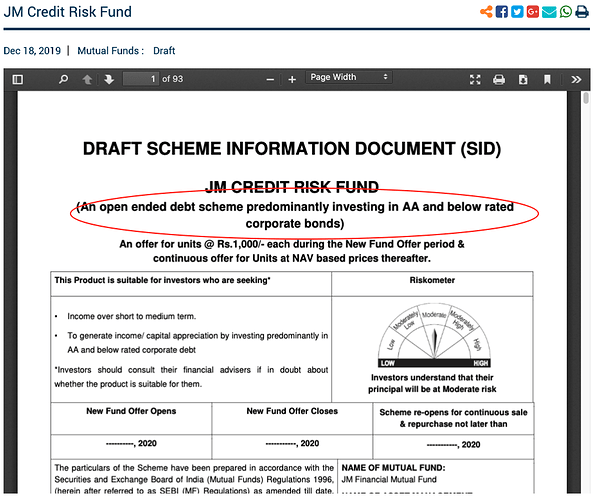Franklin Templeton has shut six of it’s scheme namely -
1. Franklin Templeton Credit Risk Fund
2. Franklin Templeton India Low Duration Fund
3. Franklin Templeton India Dynamic Accrual Fund
4. Franklin India Short Term Income Fund
5. Franklin India Ultra Short Term Fund
6. Franklin India Income Opportunities Fund
Total invested amount in these funds according to different sources is around 26k - 30k cr.
Shutting down fund means there will be no investment or redemption in the funds. The AMC and/with trustees will try to sell the assets of the funds and return the money to investors.
Now I have three questions in my mind, one I have a part answer to, remaining two remains unanswered.
Question 1 - What is the effect of this default on money supply in market?
Answer 1 - Assuming fund size to be 30k cr and money multiplier at 6. Amount of money out of system can be 1.8L cr.
Question 2 - What assets these funds hold?
Answer 2 -
Credit Risk Fund - Full Portfolio.
India Low Duration - Full Portfolio
India Dynamic Accrual Fund - Full Portfolio
India Short Term Income Plan - Full Portfolio
India Ultra Short Term Fund - Full Portfolio
India income opportunities fund - Full Portfolio
Question 3 - Who are the owners of these funds? Which companies will be loosing money in this? (Un-answered)
Let’s look at Credit Risk Fund in detail, it is segregated into three parts
Main Portfolio
8.25% Vodafone Idea - 10Jul20
10.9% Vodafone Idea - 02Sep23 partially convertible 03Sep21
Leaving Vodafone aside let’s analyse Main Portfolio -
Total fund size as of 31-Mar-20 is 4,900 cr
Out of the listed companies unknown/doubtful companies are -
Rishanth Wholesale Trading (RWTPL) - 2,300cr
owns VMMPL. VMMPL grants franchise rights for Vishal Mega Mart.
Coastal Gujarat Power - 1,8k
wholly owned subsidiary of Tata Power.
SD Corporation - 1,800
is Shapoorji Pallonji group company
Five-Star Business - 1,500
Finance start-up backed by TPG Capital, Matrix partners, Morgan Stanley, Sequoia Capital etc.
Aadarshini Real Estate Developers - 1,500
Wholly owned subsidiary of DLF Home Developers
Vistaar Financials Services - 1,300
Incorporated in 1991, MD - Ramakrishna Nishtala, Bangalore (Explore)
Aptus Value housing - 1,200
Raised 800cr from WestBridge, Steadview & Sequoia
Nufuture Digital - 850
No website, Incorporated-2007, Mumbai (Explore)
India Shelter Finance - 680
erthwhile Satyaprakash Housing Finance (Explore)
Molagavalli Renewable - 530
Incorporated-2017 (Explore)
OPJ Trading - 520
Jindal Steel promoter OPJ Trading raises fund from Centrum Credit
Incred Financial - 440
Invested by Rajan Pai (Manipal) etc.
Vivriti Capital - 390
Had series A & B round of funding.
Ess Kay Fincorp - 240
TPG growth, Norwest Venture & Evolvence India are investor
Furture Ideas - 190
(Explore)
Rivaaz Trade Ventures - 280
Invest in leasing retail space and renting to retail business.
Narmada Wind Energy - 120
Something to do we renew power (Explore)
Reliance Big - 748cr
ADAG group
Reliance Infra consulting - 50.6
Rating document

